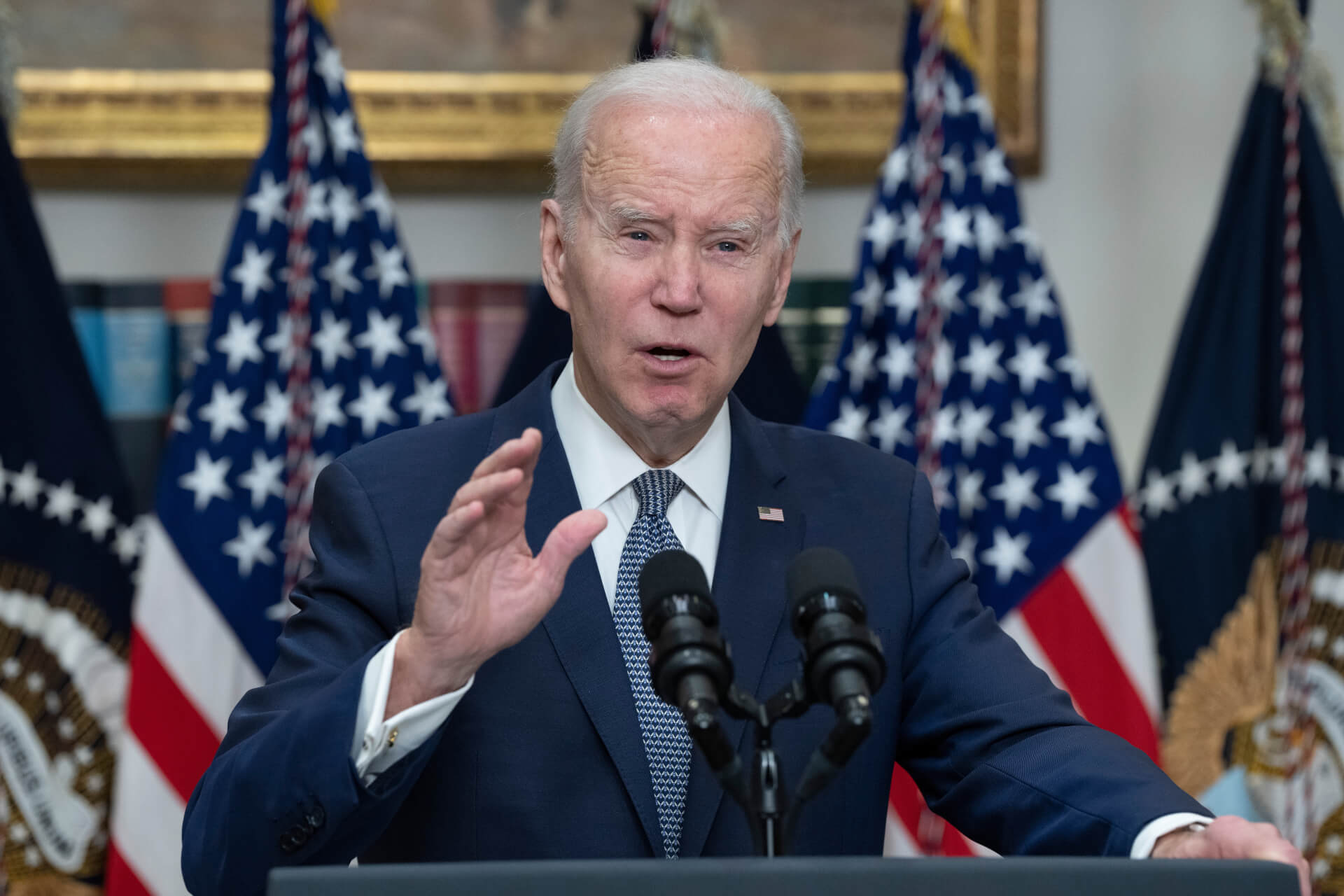US President Joe Biden’s administration came into office with a pledge of normalcy, and its Middle East policy has largely hewed to a “normal” US administration. It is pro-Israeli, it is concerned about Iran and it is generally accommodating to the Arab Gulf states. And yet, the Biden administration’s policy is markedly different from its predecessors.
The United States usually gravitates toward focusing on a “process” in the Middle East — often involving Arab–Israeli peace efforts of some stripe. The Bush administration focused on democratization (once it had moved past the initial military strikes in Iraq and Afghanistan) and the Obama administration on Iran ties. The Biden team has settled on Israeli–Saudi ties. Even so, the administration is determined not to let the Middle East become its focus, and it hopes the region will not become a distraction.
Despite the pivot to China, the Middle East continues to demand US attention
Globally, the Biden administration is focused on great power competition. Unlike the Trump administration, however, the Biden team emphasizes the importance of working with allies and partners on shared challenges with the goal of creating a more predictable, rules-based global environment. In the Middle East in particular, the administration has been intent to diminish the emphasis placed on military operations, partly through diplomacy and other aspects of statecraft and partly through efforts to boost partner capacity and partner integration. Notably, counterterrorism plays a much smaller role in Biden administration rhetoric on the region, and a US desire to help improve regional governance has remained muted.
In practice, the biggest problem the administration has had is persuading its partners of its commitment. A narrative that Biden was seeking to abandon the Middle East set in early, and this saw allies and partners scurrying to hedge against an impending power vacuum. China in particular has benefitted from this perception, a development that has fed into Washington’s global emphasis on China’s changing role. Perhaps inadvertently, a US focus on China creates tension between a desire to focus America’s attention on the Western Pacific and a desire to focus on a key area of Chinese attention, the Middle East.
For the Biden administration, getting the “China piece” right has been a challenge with two key partners, Saudi Arabia and the United Arab Emirates (UAE). Biden spoke harshly of the Saudis during his presidential campaign, and many Democratic Party activists think his criticism of the Saudis was right. The Saudis’ commitment to sustained oil production cuts, the ongoing war in Yemen and political repression at home all discomfort many Democrats. Yet Biden and his team have found the Saudis to be essential partners on everything from energy pricing to regional security to counterterrorism, and the rapid liberalization of some aspects of Saudi life is a sign that the kingdom is changing, at least in part in ways the Biden team finds constructive.
President Biden’s awkward trip to Saudi Arabia in July 2022 and Chinese President Xi Jinping’s much smoother trip in December 2022 created a visible contrast. Since then, the Biden administration seems to have found its footing with Saudi Arabia, with a series of high-level visits to help advance ties with Israel and open discussion about the possibility of normalization.
While the US-Saudi relationship has been improving in the last nine months, the US–UAE relationship has been growing more tense. Not only have the two parties failed to agree on terms to sell the F-35 to the UAE — after the agreement to do so was the foundation for Israel’s official recognition by the UAE and three other Arab governments — but tensions over the UAE’s ties to Russia, amidst the war in Ukraine, and to China have raised the temperature in both capitals. Billions of dollars in Russian assets and thousands of Russian citizens have flooded into the UAE, and there are widespread reports that the UAE is facilitating Russian economic activity. Complaints that the Emiratis were allowing China to construct a military facility in Abu Dhabi, and disbelief at their denials, raised tensions further.
The UAE had grown accustomed to being Washington’s favorite and most trusted Arab government, but much of that shine has worn off. The perception among Democrats that the UAE was too closely aligned with Trump and with Republican politics has lingered. Meanwhile, the Qatari decision to make every effort to help with the withdrawal from Afghanistan created a debt of US gratitude in stark contrast to lingering UAE–Qatar hostility dating from the 2017 blockade that other UAE allies have since abandoned.
Iran remains a Biden administration focus, but movement is slow. The administration was never able to resume direct nuclear talks with the Iranians (it came into office in January 2021; President Raisi came into office in August 2022, and the timing was never right). Resuming compliance with the nuclear accord was an initial objective of some in the administration, but this has been abandoned. The Biden administration appears to be pursuing a “less for less” strategy of something short of an agreement in return for something short of sanctions relief, built on private understandings rather than public agreements. With the Iranian economy under pressure, and with the supreme leader Ayatollah Ali Khamenei in diminishing health, the Biden team seems to have decided that Iran remains important but is not urgent and the time to negotiate heavily is not now.
Saudi–Israeli relations may be Biden’s chief focus
Some of the administration’s stickiest problems are in Israel. Prime Minister Netanyahu is the favorite of few in the Biden White House, but he is far more palatable than many members of his ruling right-wing coalition. Biden has trodden lightly in Israel’s ongoing political crisis, although his sympathies are clear. It is unclear whether Netanyahu has any wiggle room — to push off a reckoning with the Israeli public, to sustain his coalition, to tack toward the center and build a different coalition, or any other course. Meanwhile, violence is growing in Israel (both between Arabs and Jews and within the Arab community), the economy is weakening, politics are polarizing and Palestinian politics are dissolving. Israel could have a crisis on many fronts.
For Biden, putting an Israeli–Saudi peace deal front and center meets a number of needs. On the Israeli side, the prospect of a deal with Saudi Arabia, which is widely popular in Israel, allows the United States to press Israel while saying it is merely advancing Saudi normalization. For the US–Saudi relationship, serious strategic discussions have put to rest all of the discourse about the United States abandoning the Middle East. Like many processes, this one is likely to unfold over years, and the Saudi aspirations are far above what any US administration is likely to deliver or be able to deliver. For the Saudi side that’s fine.
In fact, the Saudis feel less urgency than the other parties by far. First, they are not committed to the principle of making an agreement, whereas both Israel and the United States have long talked about the importance of normalization between Israel and its neighbors. Netanyahu and Biden also face difficult political straits, and each could use a win right now. On the Saudi side, the economy is strong and Crown Prince Mohammed bin Salman believes he will be in power for decades. He can make this deal today, in five years or in ten. For such a major move, he will want major rewards. And from a purely political perspective, it is hard to imagine that he is eager to deliver a political victory to either Biden or Netanyahu; in any case, he may doubt their ability to deliver.
Last Saturday, the Saudi online newspaper Elaph reported that Saudi Arabia had frozen talks over normalization because Israel had been refusing any gesture to the Palestinians. Then, on Tuesday, The New York Times reported that the White House was exploring a formal defense treaty with Saudi Arabia. It remains unclear whether the contradictory reports of stagnation and progress are related, or what either might have to do with the shape of any future agreement. Regardless, we are likely many steps away from a comprehensive deal.
The US–Saudi–Israeli triangle is likely to be an important, and perhaps even the dominant line of effort for the United States in the Middle East in the years to come. Crises will emerge, and some are likely to displace the talks for a time. The logic of greater cooperation seems clear to all sides, however, and in the absence of other US-led processes, this one is likely to be a central dynamic over many years.
[Arab Digest first published this piece.]
[Anton Schauble edited this piece.]
The views expressed in this article are the author’s own and do not necessarily reflect Fair Observer’s editorial policy.
Support Fair Observer
We rely on your support for our independence, diversity and quality.
For more than 10 years, Fair Observer has been free, fair and independent. No billionaire owns us, no advertisers control us. We are a reader-supported nonprofit. Unlike many other publications, we keep our content free for readers regardless of where they live or whether they can afford to pay. We have no paywalls and no ads.
In the post-truth era of fake news, echo chambers and filter bubbles, we publish a plurality of perspectives from around the world. Anyone can publish with us, but everyone goes through a rigorous editorial process. So, you get fact-checked, well-reasoned content instead of noise.
We publish 2,500+ voices from 90+ countries. We also conduct education and training programs
on subjects ranging from digital media and journalism to writing and critical thinking. This
doesn’t come cheap. Servers, editors, trainers and web developers cost
money.
Please consider supporting us on a regular basis as a recurring donor or a
sustaining member.
Will you support FO’s journalism?
We rely on your support for our independence, diversity and quality.










Comment